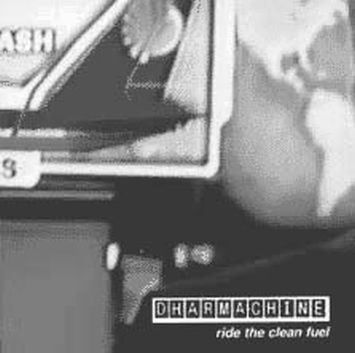
Catch a Ride
ride the clean fuel (Independent)
Dharmachine
Dharmachine can best be described as a band with an unusual blend of spacey trip-hop influenced by modern rock. Their sound is a hybrid of multi-layered effects driven by electronic and poetic rhythms. Their latest album ride the clean fuel can be included within the ambient, emotional and electronic rock categories. It is ambient because it is based on timbre, texture and deliberately shifting structures. The intense vocals and screeching guitar defines the recording's emotional content. Included in the total mix are electronic overtones that help construct their distinctive sound.

ride the clean fuel follows their debut album Bang!, which had a wide range of material with some diversity. ride is more focused and has a more dynamic effect. It adds elements of rock and has an ever-present bass during the loopy melodies and ambient overtones.
Two obvious characteristics are the recording's activity and the intensity. The pace of the songs ranges from melodramatic ("dinosaurs") to an all out blitzkrieg of guitars and electronic euphony ("sister rue"). Other songs change from a pop rhythm into electronic overdubs and distorted guitar. Like Radiohead and Bjork, Dharmachine abandoned conventional arrangements by bending and twisting music into a layered sound experience. They share the sentiments of bands like Sonic Youth that tried to destroy rock-song form. However, they veer away from that direction by not seeking pure experimental dissonance with tension overkill.
As a whole, the album displays a wide range of different energy levels. There are soft, mellow songs with hazy configurations that come to life with a rhythmic pulse as tenacious vocals and guitars are added to hypnotic drums. The song "edgy" is comprised of activity and intensity and, overall, describes the entire album: intensity moving in the same direction with explosive electronic sounds to create a work of coherence.
Melodic Storytelling
Outbound (Columbia/ Sony)
Bela Fleck and the Flecktones

If you are already a fan of this mostly instrumental ensemble, you will no doubt enjoy their most recent recording Outbound. The core of the band remains Bela Fleck on banjos and steel guitar, Victor Lemonte "I'm going to tear this bass apart" Wooten on bass, Victor's brother Future Man on synth-axe, drumitar and other percussive/sampling devices, and Jeff Coffin, a new member on sax.
The band weaves complex-yet-accessible soundscapes on Outbound without even breaking a sweat. And the addition of Coffin's sax playing raises the sonic ante, especially when they really start jamming. The Flecktones slip from smooth jazz styles to complex jams that twist and turn modulating key and time signature effortlessly. Outbound also has a more diverse sound than previous recordings and a long list of guest musicians who help fill out this lush production.
My only problem with Outbound is the addition of lyrics. I feel that when you take a band known for its instrumentals and start putting lyrics to those instrumentals simply to improve the marketability of the CD, you get the distinct propensity for musical Cheez Whiz.
The same is true for "Out Bound", despite the beauty this collection of music. The obviously overdubbed lyrics potentially de-mystify the Flecktones. Rita Sahari's throat singing on the beautiful "Shuba Yatra" is an exception. The texture of Shawn Colvin's voice works well also, but what was Bela thinking with the rapper? Luckily, they keep these distractions to a minimum and the jams to a maximum. Outbound also scores big with the lush strings of "Love Sponge String Quartet" and ethnic and sampled percussion. However, the key to the Flecktones sound remains the beauty of their melodic storytelling, virtuoso performances and many wacky changes. Other highlights include "Hall of Mirrors," a hauntingly sublime piece with guest notables Adrian Belew on guitar and John Medeski on B-3 organ.
Overall, this is a fine recording and effectively raises the bar for the future of Bela Fleck and the Flecktones.
Billy Bartley is lead vocalist and songwriter for Louisville's slackshop. You can catch them this month at the Public Radio Partnership's "Cash & Clash" benefit on October 15 at Stage Door Johnnie's and at Joey G's in Madison, Indiana on October 20.
Fat Lotta Wisdom
Fat Lotta Good (Independent)
Serpent Wisdom
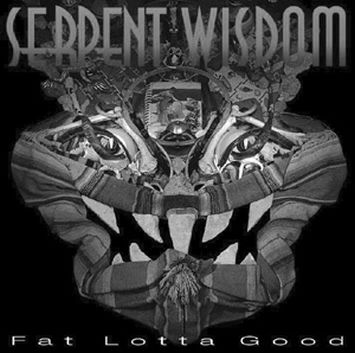
In two words, what does Louisville have in common with David Byrne and Neil Young, combining excellent musicianship, joy of experimentation and a singer who evokes a hybrid of those two?
The answer is known collectively as Serpent Wisdom, the former trio (Bassist Danny Kiely has since joined) of Jak Son Renfro, Ken Lucchese and Earbie Johnson have crafted, performed and recorded an hour's worth of original music and original lyrics for this record. It's rife with catchy melodies and beats your body can dance to, and intelligent, insightful lyrics your head can revel in.
Renfro is clearly erudite and does not spend much time in the shallow end of the lyrics pool ("I'm twisted out of shape / All tangled up in patio voodoo / There's a jihad in my head / I can't win if I don't lose") and has a sense of humor ("He don't take no bath / ‘Til he smell real bad / Leave milk in the fridge / ‘Til it turn to cheese / Without woman"). The combination of his emotional and sometimes idiosyncratic singing with Ken Lucchese's outstanding guitar work and Johnson's steady percussive beats is the sound of three extremely talented performers complementing each other.
The songs tell tales of protagonists in a variety of situations and emotions. We hear about the "Outsider" who feels like an uncertain stranger in familiar surroundings; another who wants his mate "like Jesus wanted Magdalene;" another who frightens a soulmate into deserting him; and yet another who reassures a partner that she is "made in God's likeness / don't you know?"
If this record has a shortcoming it is that Serpent Wisdom does not sound like a full band. That isn't necessarily a bad thing, but if you're accustomed to a couple of guitars, thumping bass and pounding drums, or even horns and/or keyboards, then this record may take a little getting used to. On the other hand, it may knock you out on first listen. Regardless, it is well worth your time to allow yourself to be seduced by the poetic and passionate sounds of Fat Lotta Good from Serpent Wisdom.
MetamorFlawsis
Drama (Envain Records/Flawtown Records/Better Days Records)
Flaw
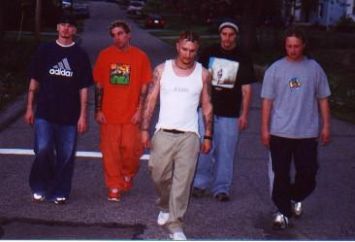
Disclaimer: The following review of the new release by Louisville's Flaw may contain some opinions that others in the music criticism racket may not readily digest. The writer declares that said opinions are honest and are not intended to provoke an altercation. The writer further declares that if any one person believes he or she to be the target of refutation by anything stated in the following review, he or she is invited to examine his or her delusions while sitting in a comfortable chair, slipping headphones on, loading the CD described in this review, and, with the volume at a reasonably high level, experiencing the electroshock value of Drama.
Rock is not dead. Why? Flaw's EP Drama says so.
Like any language that dies only when there is no one around to speak it, rock-and-roll will die only whenever there is no one left to play it. It evolves, sometimes into forms at which we marvel, other times into forms we wish would go away but must die on their own. There are certainly benchmarks used only as points of reference, not as pinnacles. And the evolution is gradual, never abrupt. In microcosmic fashion, the individual forms themselves can evolve and have their own benchmarks. That's what the metal band Flaw shows in Drama.
As a follow-up to 1999's do-it-yourself, self-titled release (which they call their "White Paper CD," since the cover was nothing but a white disc holder with a photocopied label glued to the front), Drama shows a band in metamorphosis: new members Lance Arny on guitar and Chris Ballinger on percussion (replacing Ivan Arnold), a new manager, and an added facet to their sound. Flaw (the cover story from the July, 1999 LMN) had followed in the Limp Bizkit mode of thrash metal: caustic rap lyrics over a wall of guitar loud enough to vibrate your scalp loose. To that Flaw had added actual singing with melodies that resembled mantric chants. With the band's popularity among its core audience, it would have been easy to crank out another batch of songs that duplicated the ones on first release.
But they didn't. Drama is short but provides a direction that indicates the band's growth. Lyricist and vocalist Chris Volz still drops in scalpel-edged rap segments in the songs, which contain righteous anger but deliver such Confucian lines as "action works through true confidence" in "Away," or "even the fathers of all our misguided sons are / resting in a place of no disgrace surrounded by / examples of giving grace" in "No Time." In "Only the Strong," he says to "keep your friends close, but your enemies close for real / seems easy but nothing could be so hard." In the bridge of that track, the band glides into some smooth pop rhythms and chords, which burnishes the sound without distracting the overall tone.
Flaw's Drama is evidence of a band that's growing in sound and material. It is a small example of the evolutionary direction rock-and-roll takes when its performers evolve as musicians.
It's what keeps rock-and-roll – in all its forms – alive.
The Sons of Metcalfe County Rise Again!
Songs From The Grass String Ranch (Audium)
The Kentucky Headhunters
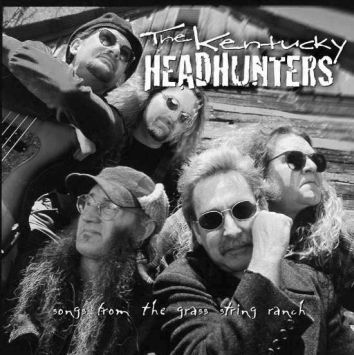
Can it be the guys in The Kentucky Headhunters are entering their thirty-second year of existence as a creative unit? It just seems like yesterday that country radio introduced the masses to their brand of Southern rock, Metcalfe County style. Songs From The Grass String Ranch finds them reunited with vocalist Doug Phelps, whose pipes provided the punch during the commercial breakthrough days of the early Nineties.
Thank goodness the misguided contemporary country feel of their last album is a distant memory. Things are rockin' once again with the decidedly "Skynnerdian" influence of the title cut conveniently placed as track one. This raunched-out ditty chronicles the simple joys of the family farm, as it is when your best friends drop by for an improvised party, and would probably remind Hank Williams, Jr., of what he used to do a decade and a half ago.
Phelps turns in a strong performance on "Back To The Sun," in which the song's narrator longs for his deceased father's return from a tragic death. But other surprises abound, like the zydeco influenced "Jessico," which probably contains the most Cajun-spun warmth you are likely to hear coming out of south-central Kentucky. Equally enticing is the Grateful Dead-meets-Barefoot Jerry charm of "Dry-Land Fish." Drummer Fred Young provides the goofy vocalization that makes this one stand out. (and in case you didn't know, a dry-land fish is a mushroom) Also, "Louisiana Coco" could be filed under one of the strangest country cuts, with its infectious 12-string guitar riff and Fred's brother Richard doing his best ZZ Top vocal/croak.
One thing that really stands out on Grass String Ranch is that the Headhunters have not forgotten how, throughout history, good country music has always contained a healthy dose of fun in the mix. The most refreshing thing is that despite having to sell CDs in order to justify making another one, these guys have forgone any delusions of crossing over, unlike many of their Music City contemporaries.
It is amazing how all the digital technology in the world can't help anyone make a good record. When it gets down to it, less is best and The Kentucky Headhunters understand this, and we Kentuckians should commend them for it.
Commercial-Free Cultural Wackiness
The Violence of Amateurs (Pretentious Dinosaur Records)
French TV
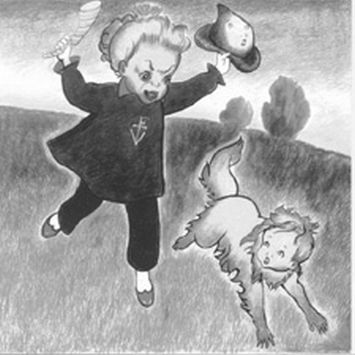
I know a woman who was born and raised in France, and I asked her what the biggest difference is between American and French television. "Commercials," she snapped. "You have too many commercials on TV. Plus your news starts too early." She admitted, however, that she hasn't lived in France for more than a decade and knows that French broadcasting has become more commercial and less tax-based. In an era of global deregulation and decentralization of services, the world is slowly catching up to the American model of commercial broadcasting, which may not be a bad thing. Just think: if the networks and stations didn't sell their available time, how else could we have enjoyed those umpteen thousand years of Urkel?
You won't find commercial breaks (or traces of Urkel, praise Allah) in The Violence of Amateurs from Louisville's French TV. No short, ready-for-airplay tunes that will later sound pleasing when seeped through speakers in an elevator. Nothing hummable. Nothing that can be used in a karaoke machine. But what you will find is a wacky miasma of long songs with strange melodies, oddly paced rhythms and instrumentation ranging from the obvious (bass, drums, keyboard, guitar) to the bizarre (Hawaiian nose flute, doorbell, and quarter-inch jack). On your first listen, the influences are obvious: King Crimson's progressive bombast, Frank Zappa's stream-of-consciousness leaps from melody to melody, Carl Stallings' cartoon stingers. And with song titles that reference science, Soviet cinema and old comic strips, the work in Violence seems to say, "The entire culture is a playground. Let's go see if we can bury the swing set in the sandbox."
French TV consists of core members Mike Sary (bass), Dean Zigoris (guitar), Bob Douglas (drums) and John Robinson (keyboards). Also appearing are Splatch's Greg Acker on saxes and flutes, Eugene Chadbourne on banjo (Chadbourne will present a concert on October 1 at Artswatch), Cathy Moeller on violin, Steve Good and Aevil on clarinet and saxes, and several others. From this collective comes the opening polyrhythmic/polymelodic track "The Kokonino Stomp" (an appropriate anthem for the surreal Kokonino County, where the comic strip "Krazy Kat" took place). It is followed by "The Secret Life of Walter Riddle," which starts out as a march but jumps right into a segment that sounds like the music we would hear in the old Batman television show when he and Robin were thrashing the crap out of the villain-of-the-week's henchmen. It even contains a few stingers so you can paste "Pow!" and "Whap!" on your own mental TV screen. The title itself is a blend of two cultural morsels: Nelson Riddle, who composed the music used in "Batman," and James Thurber's short story "The Secret Life of Walter Mitty," about a mousy man who frequently leaps in and out of a world of fantasy. Admit it – there are times you wished you had Nelson Riddle's Bat-tunes playing in the background behind you, like when you lay a patch of rubber in your driveway or have face-off with your boss (and wished that he or she had a group of guys in black sweatshirts and wool hats to charge at you so you could make a few "Pows!" and "Whaps!" yourself).
The band also manages some surprisingly gentle jazz in "Mail Order Quarks" and finishes with the lengthy "Joosan Lost/The Fate," segmented into movements that are complete unto themselves, yet vaguely connected. Kind of like a night of Internet surfing.
It's all of the above and more. So unhook your brain. Tune in to French TV and The Violence of Amateurs.
The Joy of Fiddlin'
Fiddle Man(Independent)
Steve Day
Each year I am pleased and surprised at the increasing number and quality of Bluegrass musicians. I am not sure where they come from, but one of them has been rambling around Kentucky for years. Steve Day first came to my attention in 1992 with the release of his excellent Fiddlin' On Music Row. Not long ago, he was a driving force with Gary Brewer and The Kentucky Ramblers. Today, he is putting his talented fingers to work with Continental Divide. Day's recent project is another extraordinary recording sure to satisfy the discriminating Bluegrass ear. The liner notes describe his studio experience as a "blast" and one listen will prove it true.
In addition to Day's sensitive fiddle work, several tunes provide a fine showcase for his vocal talents: "We Were Made For Each Other," and "Won't You Kiss Me One More Time." Steve's cover of Glenn Campbell's "Less of Me" is a timely message in an age where we are surrounded by greed and violence. The song suggests an obvious fact: the world would be a better place if everyone assumed responsibility for their behavior and thought more of others and less of themselves.
Day surrounds himself with outstanding players. One of his personal musical heroes, Glenn Duncan, provides exciting harmony fiddle on "Come Back To Me In My Dreams," and "Won't You Kiss Me One More Time." Larry Stephenson lends his incomparable tenor vocal to "Lonesome Without You," "We Were Made For Each Other" and "Won't You Kiss Me One More Time." The astounding mandolin talents of Ronnie McCoury graces "Fire On the Mountain" and "The Old Brown County Barn Jamboree," then everyone shifts into high gear on "Gold Rush."
Throughout this release David Parmely's guitar work is flawless, and he does some fabulous picking on "Gold Rush." Elmer Burchett's banjo is bold and enthusiastic but no more so than in "Lonesome Without You." The bass line from Mike Anglin is polished and bright. He really shines as he slaps it in "Come Back To Me In My Dreams," and others. Danny Barnes's mandolin is brisk and crisp especially in "Come Back To Me In My Dreams."
To summarize, Steve Day knows the craft of fiddlin', and, as you can hear in Fiddle Man, we are better off for it!